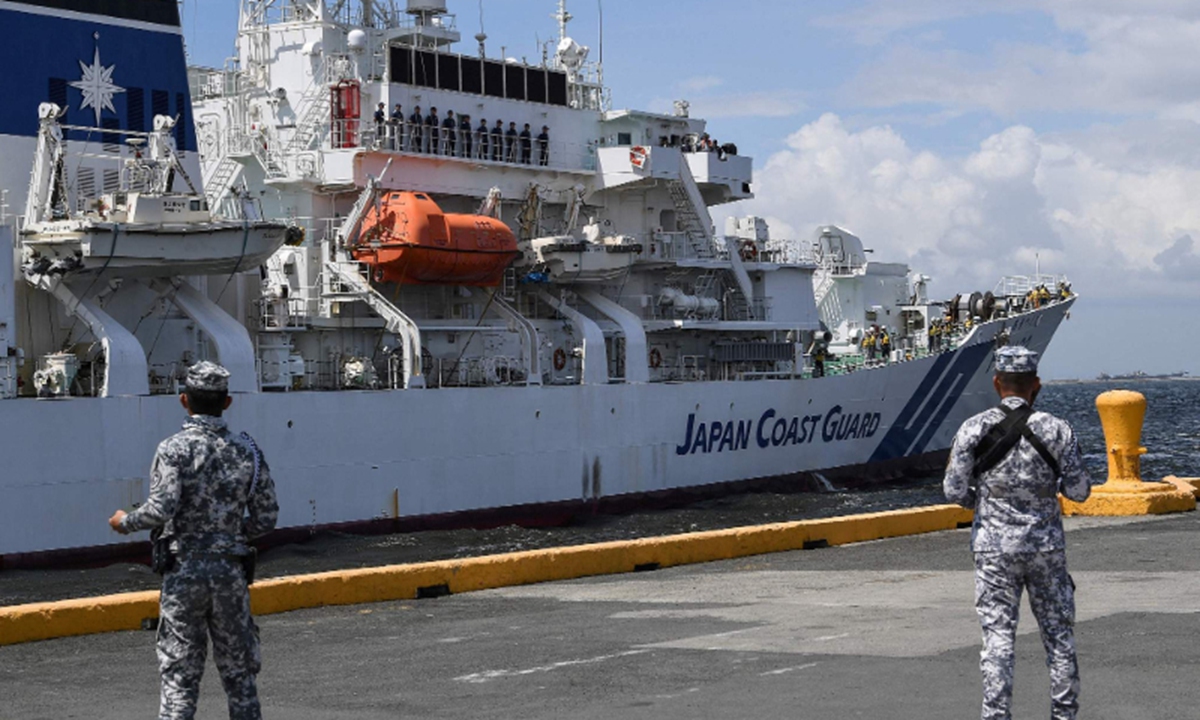
Philippine coast guard personnel stand guard as Japanese coast guard ship Akitsushima arrives at the international port in Manila on June 1, 2023, ahead of a joint maritime exercise with the Philippines and the US. Photo: VCG
Japan will host a multilateral meeting over security support with the defense ministers of 14 island nations in the South Pacific region in Tokyo on March 19 and 20. According to the South China Morning Post (SCMP), the meeting will involve Japan's Self-Defense Force (SDF) and police taking part in local and regional responses as well as training. Analysts suggest in several reports that China is the primary target of this meeting.
In essence, Japan's "security support" appears to be more like an effort to counter China.
"In fact, Japan has long been gradually breaking through the restrictions from the Japanese Constitution on the SDF," said Da Zhigang, director of the Institute of Northeast Asian Studies at Heilongjiang Provincial Academy of Social Sciences. The Japan Maritime Self-Defense Force website states that their mission is to "protect the safe and free use of oceans as the life line of Japan surrounded by the sea." Initially focused on coastal defense, the Japan Maritime Self-Defense Force has now become one of the world's most powerful navies, straying far from its original purpose.
Experts note that Japan's SDF has shifted from a purely defensive role to building capabilities for counterattacks and offensive operations. From the participation of the SDF, it's clear Japan's assistance to Pacific island countries comes with selfish motives. The SCMP also summarized Japan's actions this time as "steps away from decades of Pacific policy to counter China's dealmaking in a remote but strategically crucial region."
The shift may have transitioned from economic diplomacy to military diplomacy. The Japanese SDF has already intervened in regional affairs in various ways, and if this trend continues, SDF's future involvement in Taiwan Straits affairs may only be a matter of time, Da added. This not only risks dragging the Pacific region into a dangerous quagmire but may also lead the world into turmoil once again.
The involvement of Japan's SDF in local and regional responses seems to be aimed at addressing local security issues and so-called external threats faced by Pacific island nations. However, in reality, it may be an attempt to place these nations under the actual control of countries like the US and Japan.
The Pacific is considered by Washington as an "American lake." However, the US has not followed through on its promise on economic assistance when it comes to issues concerning the Pacific island countries. Acting as the "security guard" of the American "backyard," Japan, at the request of the US, is trying to enhance its influence in the region economically, politically and even militarily. This is to prevent other countries that the US considers as rivals, such as China, from intervening in the region.
Japan also hopes to expand its overseas political influence. With US' support, Japan's ability to intervene in regional and local affairs continues to increase, and its ambitions continue to grow.
But do Pacific islands really need so much "security support"?
Pacific island countries under "security support" will be more like pawns manipulated in the Indo-Pacific Strategy. Every country needs to establish its own external security mechanism to prevent foreign invasion, which is not wrong at all, but the key issue is that countries like the US and Japan have exaggerated the external threats faced by Pacific island countries. They even spread rumors and stir up troubles, constantly exaggerating the "threat" from imaginary enemies. The security of Pacific island countries has increasingly become an excuse for the US and Japan to counter China. What we see is that countries like Japan and the US do not consider the real needs of Pacific island countries but only consider imposing their own political, economic, and military interests on them.
The "free and open" mentioned by the US and Japan means that if you support the US and Japan, your country will be free; the US and Japan need to enter your country, so you need to be open.
Small island countries in the Pacific region are actually struggling to survive in the middle of great power competition, and any external security measures could bring risks to the region. Some Pacific island countries actually have a clear view of their own interests in relation to the US, Japan, and even Australia, and they understand that China is trustworthy. They need to be vigilant toward a scenario when their country is used as a pawn to be forced to become a sacrifice in major power games.
If Japan truly cares about the survival and security of Pacific island countries, they should first pay attention to their protests and demands regarding the discharge of nuclear-contaminated water rather than selectively ignoring their interests.




